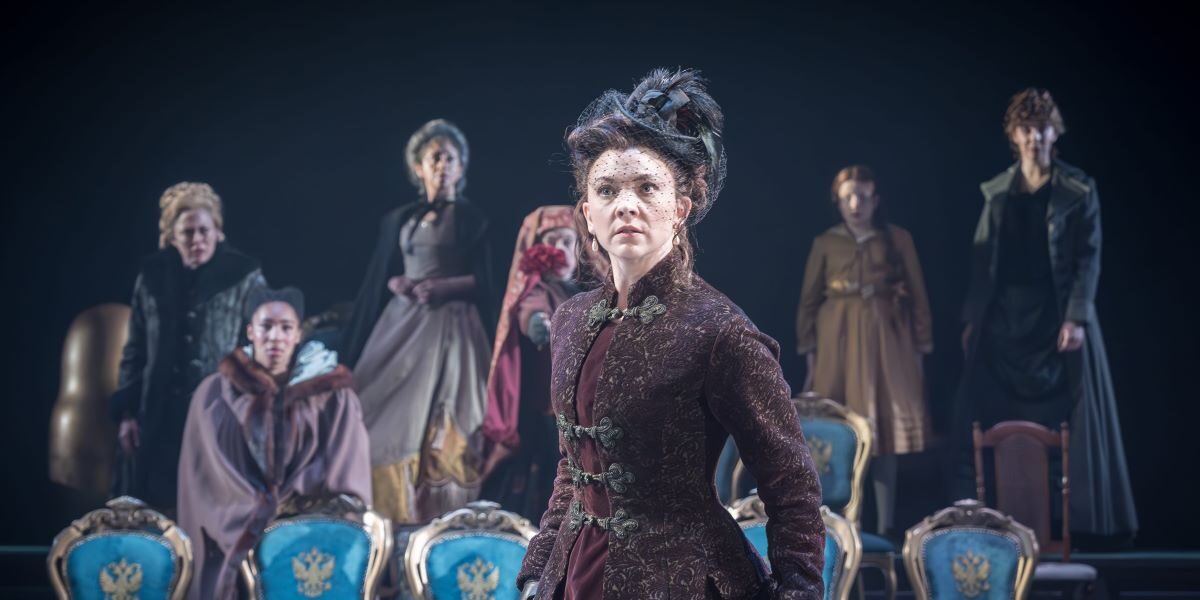Adapting a novel of the size and range of Anna Karenina is an impossible task. You have to omit scenes and condense dialogue which must diminish the greatest achievement of the book, namely the way in which universal themes are threaded so unforgettably and minutely through the diffuse textures of Russian society in the 1870s. The natural tendency is to focus narrowly on the love triangle of Anna, Vronsky and Karenin, and adaptor Phillip Breen deserves great credit for insisting on the fact that this is above all a study of three marriages, rather than one.
This version focuses as much on the relationships of Stiva and Dolly and Levin and Kitty, and is much the richer for it. We see the problems that stem from serial infidelity and multiple pregnancies, misunderstandings of town and country life, and the consequences of differences of age and experience. These receive as much weight as the perils of grand romance crashing up against social convention. Judging from the smiles and grimaces of recognition in the audience around me the presentation amply fulfilled the promise of the novel’s famous opening line: ‘All happy families are alike, each unhappy family is unhappy in its own way.’
Breen’s expressionist direction and the flexible, supple set by Max Jones both ensure great fluidity of action and plenty of social commentary on modernisation in Russia in the 1870s – the whole cast vocalise collectively to simulate the shrieks and whistles of a train station and greet the arrival of electric lights as they descend from the flies with fear and wonder. They satirise high society entertainments in a single sashay and then mellow into glowing pastoral repose when the action shifts to the country. The variety of mood and materials is admirable, but in the first half at least, perhaps too urgent, rapid and frenetic, like a speeded up film of the era. There is some damage here to character development, and to the emergence of the romance between Anna and Vronsky in particular, which is sketched in too briefly and sketchily despite the meaningful acting of the principals.
There is real strength in depth in the casting, only some of which I can record here. In the title role Natalie Dormer is very impressive, despite this degree of displacement from the centre that I have mentioned. She has the poise, elegance and personal magnetism you need in the first half, and is fully master of the mounting hysteria and morphine-enhanced desperation of the closing scenes. There just is not the chemistry and connection with Seamus Dillane’s Vronsky that would take this up to another level. Like Dormer, he really begins to spark in the fraying episodes of recrimination rather than their earlier encounters. In contrast, Tomiwa Edun, depicts the twists and turns of Karenin’s moralising with a grave dignity that makes him a much more sympathetic character than usual.
Among the supporting cast there are many notable characterisations of rare depth and poise. Shalisha James-Davis captures Kitty’s volatile, skittish enthusiasm and changeability; and Jonnie Broadbent presents Stiva as an infuriating blend of charm and feckless deceit. He is a key foil for the other characters in so many scenes that in some way he is the glue that holds much of the play together. But the two performances that will remain longest in my memory are those by David Oakes and Naomi Sheldon. Oakes embodies Levin’s social awkwardness and earnest devotion to his estate and to the cause of reform in Russia that Tolstoy wishes to recommend. But goodness can easily be boring, and he avoids this with a loving goofiness and wry self-mockery that is highly endearing. Sheldon, as the long suffering Dolly, is the other character who gains self-knowledge and self-mastery in the course of the novel. She avoids self-pity and shrewishness with a similar degree of empathy to Levin’s, and the remarkable coach-ride monologue in which she celebrates Anna’s courage in fighting for her independent identity is, for me, the moral centre and high point of the whole production.
Chekhov wrote of the original book that while not a single problem is resolved, it is such a satisfactory work because all the problems are so correctly stated. Similarly, it can safely be said of this production that it is hard to imagine a staging that could give a fuller or fairer statement of the themes and dilemmas of this teeming miracle of a novel.
Adapted and directed by Phillip Breen from the novel by Leo Tolstoy
Cast includes: Jonnie Broadbent, Les Dennis, Seamus Dillane, Tomiwa Edun, Natalie Dormer, Ivan Ivashkin, Shalisha James-Davis, David Oakes, Naomi Sheldon
Photo Credit: Marc Brenner
Until 28 June 2025
3 hrs 15 mins including interval

